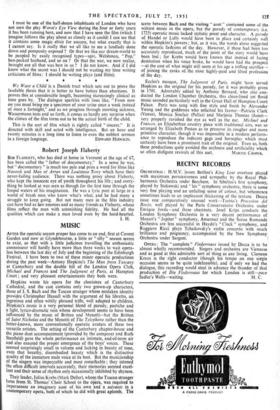MUSIC
AFTER the operatic season proper has come to an end, first at Covent Garden and now at Glyndebourne, a little or " silly " season seems to exist, so that with a little judicious travelling the enthusiastic connoisseur will hardly have more than three weeks to wait opera- less between the last day of July and the beginning of the Edinburgh Festival. I have been to two of these minor operatic productions during the past week—Antony Hopkins's The Man from Tuscany at Canterbury and the double bill of the London Opera Club, Michael and Frances and The Judgment of -Paris, at Hampton Court ; and very pleasant entertainments they both were.
Hopkins wrote his opera for the choristers of Canterbury Cathedral, and the cast contains only two grown-up characters, those of J. S. Bach and the Tuscan stranger whose mistaken identity provides Christopher Hassall with the argument of his libretto, an ingenious and often wittily phrased trifle, well adapted to children. Hopkins's music is a very personal blend of parody, pastiche and a light, lyrico-dramatic vein whose development seems to have been influenced by the music of Britten and Menotti—but the Britten of Saint Nicholas and the Menotti of The Telephone rather than the better-known, more conventionally operatic avatars of these two versatile artistes. The setting of the Canterbury chapter-house and the piano duet accompaniment (provided by the composer and Ruth Stanfield) gave the whole performance an intimate, end-of-term air and also ensured the proper emergence of the boys' voices. These seemed surprisingly small in volume and lacking in beauty of tone, even that breathy, disembodied beauty which is the distinctive quality of the immature male voice at its best. But the Musicianship of the singers was impeccable and most remaiirable ; they intoned the often difficult intervals accurately, their memories seemed excel- lent and their sense of rhythm only occasionally inhibited by shyness.
Their leader, Julius Krebs (Mark Deller), whom the Tuscan stranger lures from St. Thomas' Choir School to the opera, was required to impersonate an imaginary aunt of his own and a suivante in a contemporary opera, both of which he did with great aplomb,. The scene between Bach and the visiting " aunt " contained some of the wittiest music in the opera, but the parody of contemporary (i.e. 1725) operatic music lacked stylistic point and character. A parody of Handel or Lully would have been in place and certainly well within Hopkins's powers ; but, as it was, the words alone suggested the operatic fashions of the day. However, if these had been too accurately reproduced, much of the point of the story would have been lost ; for Krebs would have known that instead_ of facing destitution when his voice broke, he would have had the prospect —at the cost of what might still seem at his age a trifling sacrifice— of joining the ranks of the most highly-paid and feted profession of the day.
Eccles's masque, The Judgment of Paris, might have served Hopkins as the original for his parody, for it was probably given in 1701. Admirably edited by Anthony Bernard, who also con- ducted the London Chamber Orchestra, this clean-lined yet florid music sounded particularly well in the Great Hall of Hampton Court Palace. Paris was sung with fine style and finish by Alexander Young and the goddesses who solicited his favour—Patricia Clark (Venus), Monica Sinclair (Pallas) and Marjorie Thomas (Juno)— very properly ravished the eye as well as the ear. Michael and Frances, an Elizabethan country piece with traditional airs, was so arranged by Elizabeth Poston as to preserve its rougher and more primitive character, though it was impossible in a modern perform- ance to reproduce the indecent gags and horseplay which must certainly have been a prominent trait of the original. Even so, both these productions quite avoided the archness and artificiality which so often disfigure revivals of this sort. MARTIN COOPER.


































 Previous page
Previous page